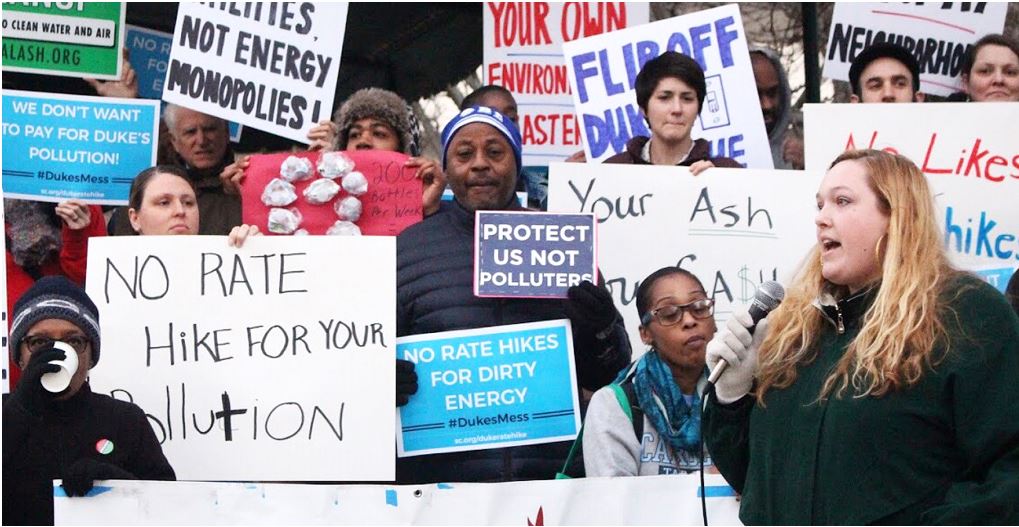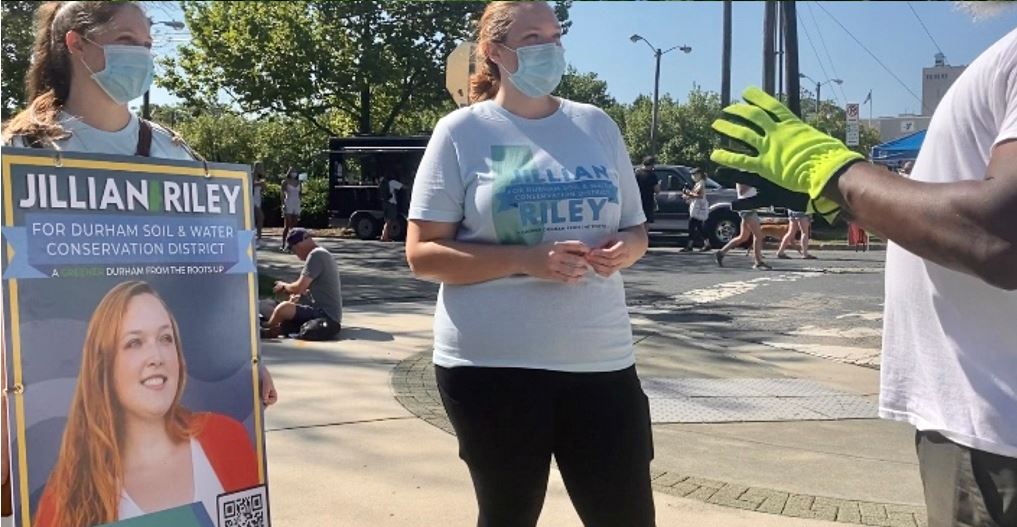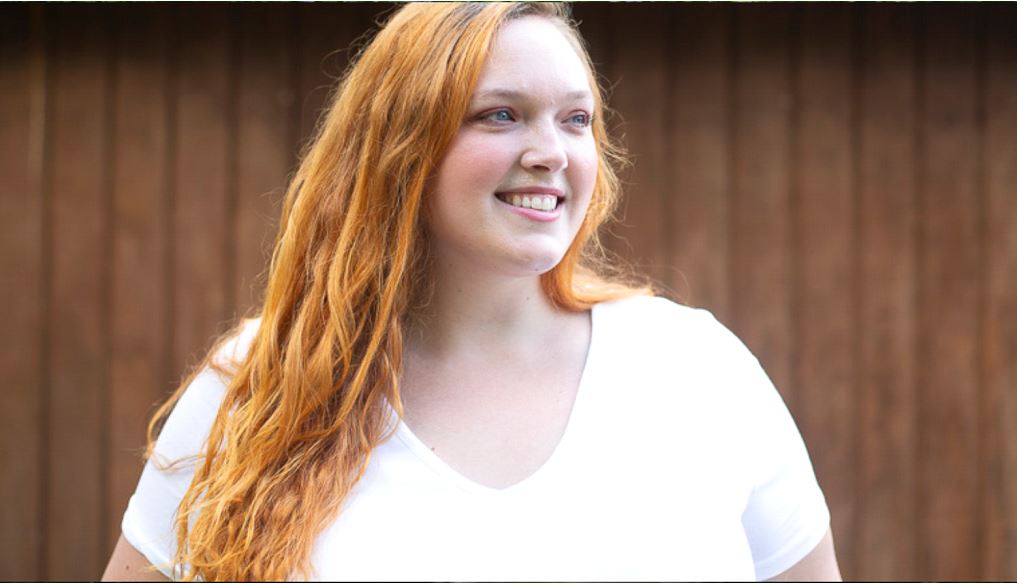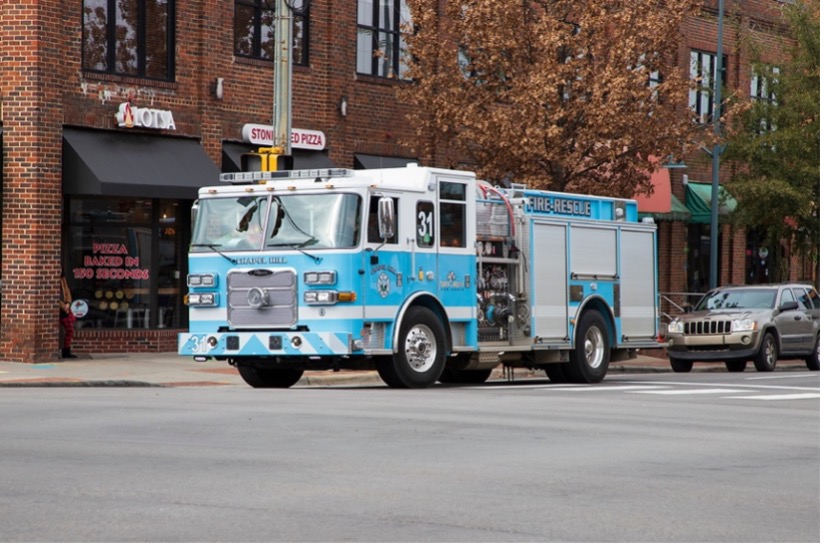As part of the Carolina Social Workers Action for Voting (C-SWAV) this fall, Averyl Edwards checked in with fellow student Jillian Riley to talk about voting, volunteering, and running for office. To watch highlights of the interview click the link at the end of the block. To learn more about her campaign and to volunteer click here.
Jillian Riley has been an environmental justice activist since she was 15 years old, when she started a club to raise money for local farmers using sustainable and humane practices as a way of standing up against factory farming. She worked with organizations across the state to hold Duke Energy accountable for its 2014 coal ash spill, a campaign they ultimately won and got Duke Energy to pay to clean up the mess that it had made.

Jillian came to UNC for her Masters of Social Work because of its Community Management Policy and Practice program, inspired by professors’ dedication to community engagement and structural change. “One thing I always say,” she explained, “is being able to understand the struggles of one individual and how they’re manifested systemically is the job of a social worker, but being able to understand how to change the social-political system that impacts an individual, a community or a nation, that’s the job of a macro social worker. And for me I take that job very seriously.”
One burning question on the minds of many is why run in a local government election while in graduate school? As Jilian emphasized – “It’s something we always say in school that we need more social workers in office, and here I am, going for it.”
Jillian has received the North Carolina chapter of the NASW-PACE’s endorsement for her campaign. She was thrilled to receive the support of the social work community: “To get the NASW endorsement and the support of other social workers, it means that we all understand that we have a unique skill set and a unique perspective, and we need to be in positions of leadership to be able to help fix and change these structural issues in our community and in the nation.”
The word “unprecedented” has been used often enough in the last few months that it’s no surprise to anyone that the November 2020 election has meant drastic changes for candidates’ campaign strategies. C-SWAV members wanted to know more about campaigning during a pandemic.
No stranger to campaigning due to her experience in environmental justice, Jillian says that if not for the pandemic, she would be going door to door if she could. In place of that, her campaign has adopted a new strategy called “digital door knocking.” She and her team of student interns, volunteers, and graphic designers are connecting with voters through Facebook pages–friending them, liking their things, and reaching out to ask if they are planning on voting and/or have heard of Jillian Riley. “And it’s working!” she enthused, “In just the past few months, we’ve engaged with thousands of voters.”
Jillian’s campaign has also focused heavily on phone-banking, a weekly event on Sundays playfully named “Sunday Phone-day.” She prioritizes making her volunteers feel supported and prepared, so the first part of the event involves training and break-out groups where volunteers can practice role-playing. They do two rounds of phone banking, with a short check-in at the mid-point, and give space at the end to debrief.
A third arm of Jillian’s campaign strategy is weekly canvassing the Durham Farmers Market on Saturday mornings. Flanked by three interns sporting a sandwich board so that folks can see her platform even from a distance, Jillian has countless one-on-one chats with voters about everything from what the Soil and Water Conservation District is to clarifying the rules around mail-in voting. After each conversation, her team hands out seeds for “forget-me-not” flowers as a cute reminder of the conversation and position for which she is running.

“Misinformation,” Jillian explained, “is going to be the biggest challenge this election. People don’t know how to vote, where to vote, when to vote, if their vote matters, if their vote counts, if they get a mail-in ballot will it actually get there in time…”
Her campaign couldn’t be more clear about what they are telling voters: “Request a mail-in ballot, have a back-up plan, and know that your vote does matter, and now more than ever, it will count.” She worries about people waiting in line on election day, getting anxious about the long lines and people around them not wearing masks, and then leaving without even voting. She makes sure to tell people that “you can actually request a mail-in ballot and still go to vote in person,” or drop the ballot off at your county’s Board of Elections.
“There are so many opportunities to get involved,” Jillian assures us all, “If you’re interested in supporting the democratic process, just registering people to vote can really go a long way.” She recommends the organization You Can Vote, which provides trainings to volunteers interested in helping people register to vote.
Candidates also need additional volunteer support as they face the new challenges of this election. Within her own campaign, Jillian has a number of volunteer opportunities: internships for teens and college students, phone banking on “Sunday Phone-Day,” and canvassing at the Durham Farmers Market.
She also points out that in this new world of digital organizing, one can support a campaign that is in another district or even another state. People can volunteer to phone bank for a close race in Wisconsin, or West Virginia, or as far away as California.
Our final question was – “What Gives You Hope”?
“Well, as an organizer,” Jillian concluded, “protests give me hope. I love seeing people actively engaged, on the streets holding signs. It happens because of injustice, but over time we see massive changes. And it’s tough sometimes, because we want changes overnight and that’s not how it works. We’re going up against a massive system, and the fact that we’re able to make this many waves gives me hope. It lets me know that as a people, we will not be silent when we see continuous forms of injustice. Being able to have hope in individuals and communities lets me know that we should continue fighting because at some point, in some time, we will see massive changes.”

